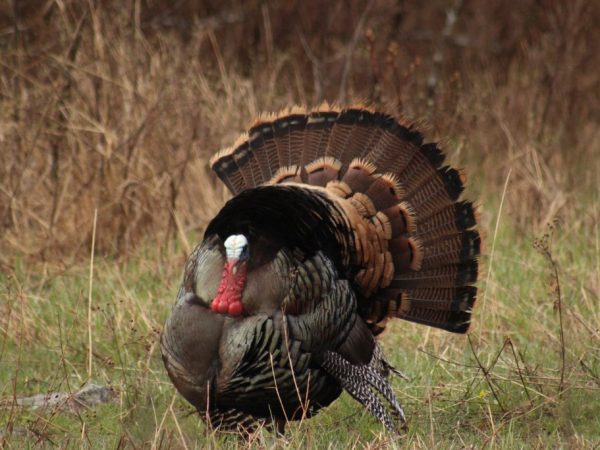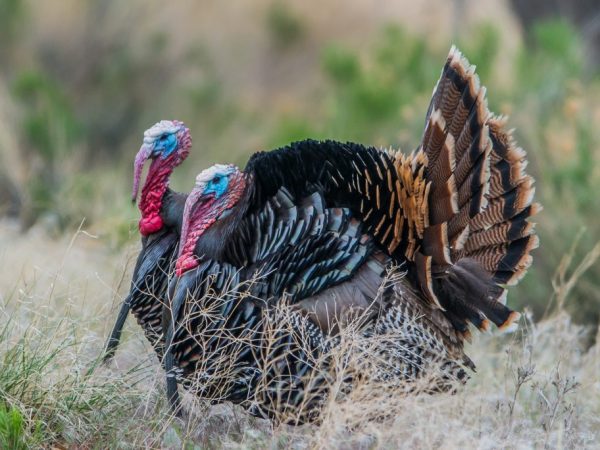Causes of pecking in turkeys and measures to prevent this problem
Often breeders are faced with such a problem as pecking in turkey poults. This manifestation of cannibalism can cause irreparable harm to the farm, especially in the first weeks of the chicks' life. But pecking does not happen for no reason, poor conditions of detention, hunger or diseases of turkey poults are to blame.

Causes of pecking in turkeys and measures to prevent this problem
Reasons for pecking
It is impossible to answer unequivocally why turkey poults peck each other until they bleed. There are many reasons and they all have a completely different nature of origin. Cannibalism begins most often with pecking eggs, then the bird switches to itself or weaker chicks.
In order to stop pecking at domestic turkeys, it is necessary to find out its Reason. Most often, turkey poults peck each other due to:
- Digestive problems. They provoke turkey has diarrhea and contamination of feathers in the anal area. This attracts his other brethren and leads to pecking.
- Too bright lighting gives chicks the opportunity to see the bleeding cloaca of the brooding turkey. During the egg-laying period, the cloaca experiences constant stress and may crack and bleed.
- Manifestations of hierarchy in the flock. If you plant a new turkey, then the rest begin to peck his head and wings. It is for this reason that it is recommended to form groups of chicks by age.
- The turkey's weakness or soreness also contributes to cannibalism. Stronger individuals pounce on the chick and peck at it.
- Lack of nutrition or contaminated food and water. Trying to make up for the lack of nutrients, birds peck at all who come across them. As a result, almost all chicks of this group remain injured.
- Too crowded content leads to the same result.
But in addition to cannibalism among the livestock of turkeys, it often happens that the turkeys begin to peck themselves. As a result, the sight of blood attracts other fellows as well. Turkey poults themselves peck at themselves due to an excess or lack of protein foods in the diet. Because of this, small cracks form around the anus, causing pain and discomfort to the bird and causing harm to itself.
Another common reason turkey pecking occurs is excessive dryness of the environment. They have to strain the coccygeal gland to secrete secretions and lubricate their feathers. This causes discomfort, and the turkey begins to peck at itself.
Some turkey breeds have a genetic predisposition to pecking at their fellows. They are not recommended to be kept together with the rest of the bird, and even more so with chickens or guinea fowls. Young animals are divided into small groups and kept like that throughout their lives.
How to deal with biting
If there are signs of cannibalism among the livestock, then it is necessary to urgently take measures to eliminate its Causes. The fact is that such behavior can become a habit and it will be unrealistic to wean such turkeys.
Recommendations will help to cope with the problem of pecking
The reason why little turkey poults peck at each other is due to improper bird keeping. In order to avoid problems, it is recommended:
- Maintain optimal temperature. This is important, since chicks are not yet able to independently regulate their body temperature. In the first week of life, the temperature should be 36-37⁰ C. A higher temperature leads to dry air and the need for increased work of the coccygeal gland, low - makes babies huddle together. In both of these cases, the case ends with a scolding. It is also necessary to ventilate the room where the chicks are kept.
- Normalize the diet. In most cases, this helps to cope with cannibalism among poultry. The daily protein intake for turkeys at the age of 1-4 weeks is 26-28 grams, and by 4.5 months it is reduced to 14 grams. Failure to comply with these proportions entails the development of acidosis, accompanied by a weakening of the anal muscles. chicks begin to peck at the affected cloaca.
- Make up optimal groups of birds of the same age, so that stronger chicks do not peck weak ones.
- Dim lighting. This will prevent the cubs from seeing the cloaca and the presence of blood in the female, and thereby reduces the risk of problems.
- Replenish the lack of minerals. If there are not enough trace elements and minerals in the diet of turkeys, then they are very likely to begin to peck and pluck feathers from their sisters and brothers.
- Jigging of wounded individuals. They must be immediately removed from the pack, so as not to provoke a surge of cannibalism.
- Organize free walking. He helps to cope with the birds pecking each other to the blood. Walking with the ability to dig the ground and nibble the grass significantly reduces the risk of cannibalism. Walking allows you to distract the chicks with more interesting things.
- Parasitic infestations also often lead to problems with cloaca pecking. If the birds are sick with a louse, they will pinch themselves and those around them. Measures should be taken to treat poults from parasites.
Trimming beaks
The disease begins with the fact that birds pluck out feathers for themselves, as well as peck at their paws and tails, then switch to their fellows. If it is not possible to prevent pecking of chicks until they bleed, then it is necessary to resort to more radical methods.
Breeders trim the beaks of young animals up to two weeks of age. This procedure is called debicking. They spend it at the coldest time of the day. It is advisable to trim the beaks of all livestock at the same time. A missed chick will become a dangerous killer, since he alone will retain the ability to injure others.
After trimming, it is recommended to increase the illumination in the place where the birds are kept, as well as increase the nutritional value of the feed. The temperature for the first 2-3 days after pruning should be a couple of degrees above normal.
Only a small part of the upper beak is cut off, no more than 1/3 of the entire length. This must be done carefully so as not to catch the blood vessels. Over time, the pruning is repeated.
In addition to the fact that turkey poults with clipped beaks stop hurting their fellows and themselves, the percentage of spilled feed is also reduced. But debicking is an extreme case, when all methods have already been used, but the livestock continues to decline due to pecking.
Treating injured chicks
Wounded turkey poults must be isolated from the rest of the livestock, because they begin to feed worse and weaken. chicks have to constantly hide from the attacks of their fellows and very soon they die from wounds or from exhaustion.
Individuals with minor injuries can be cured by treating the wounds with an antiseptic. For this I effectively use the drug ASD - 2F. Wounds are rubbed with a cotton pad soaked in hydrogen peroxide in order to remove dirt and stop bleeding. Next, they are treated with an antiseptic drug.The procedure is carried out several times a day until the wounds heal and the skin is completely restored.
It often happens that turkey poults do not just damage the skin, but peck at the eyes, the anus, provoking cloaca prolapse. To avoid this, the livestock should be checked as often as possible and injured chicks should be removed in a timely manner. If the bird is seriously injured, then there is no point in nursing it.
Conclusion
not only young animals, but also adults are susceptible to cannibalism, and if measures are not taken in time, then you can lose, if not all, then most of the livestock. It is better to resort to biting prevention than to try to wean the chicks from this business later.
It is important to remember that turkeys are rather picky birds in terms of diet and conditions of detention... The slightest deviation from the norm is fraught with the death of the herd. You should also watch out for nutritional value and adjust it if necessary.



